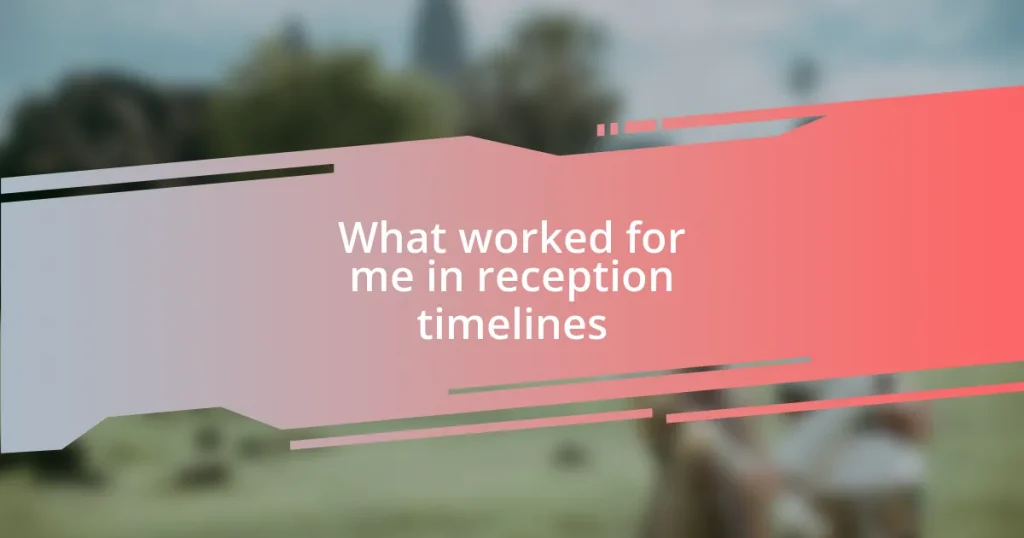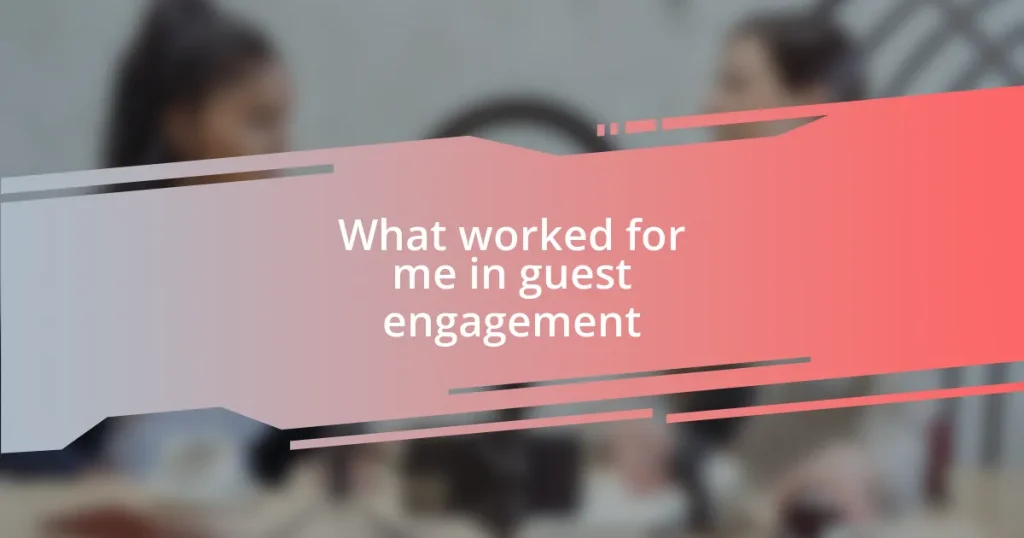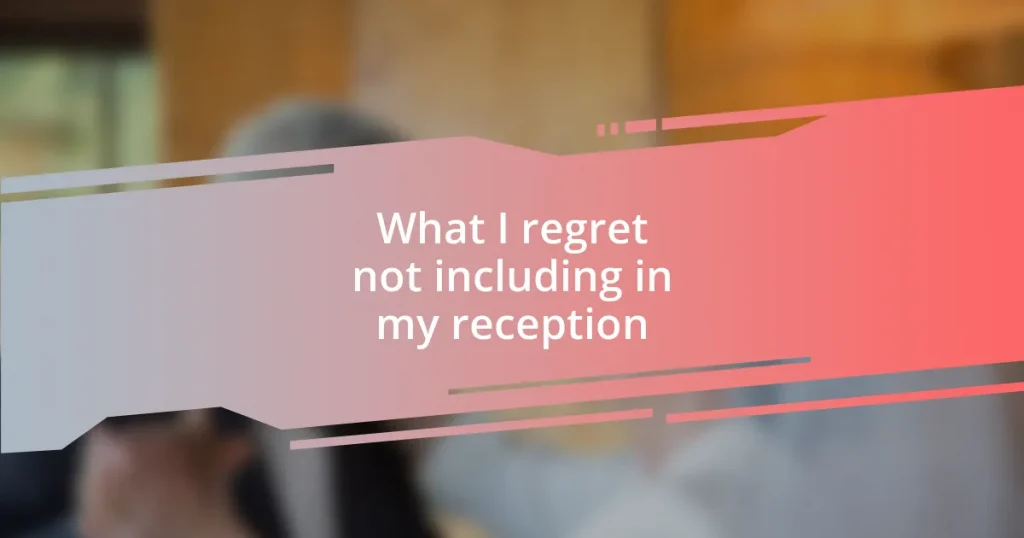Key takeaways:
- Understanding and personalizing guest communication enhances their experience and builds loyalty.
- Prompt responses to guest inquiries foster trust and appreciation, turning potential frustrations into positive interactions.
- Utilizing various communication tools, like instant messaging, email, and social media, can streamline guest interactions and improve engagement.
- Effectively managing expectations and handling feedback with empathy can transform challenges into opportunities for relationship-building.

Understanding Guest Communications Strategies
When it comes to guest communication strategies, I’ve found that understanding your audience is paramount. For instance, I once tailored my messages based on feedback from visitors who expressed a desire for faster communication. By implementing a more streamlined response system, I significantly enhanced guest satisfaction. Have you ever noticed how a simple adjustment can make a world of difference?
One of my favorite methods has been the use of personalized messages. Guests often appreciate a touch of authenticity in interactions, something I learned the hard way. I remember sending a generic welcome email once, only to receive a response from a guest who felt overlooked. From that moment on, I shifted to including personal touches, like mentioning their booking reason—it truly elevates the guest’s experience.
Additionally, I can’t stress enough the importance of being proactive. For instance, during a particularly busy season, I proactively reached out to guests about potential delays in response times. The reactions were overwhelmingly positive; they appreciated the transparency and felt more included in the process. Have you ever considered how being upfront with information can build stronger relationships?

Importance of Prompt Responses
It’s incredible how quickly a response can shift a guest’s experience from frustration to appreciation. I once had a situation where a guest was anxious about a last-minute change in their booking. When I replied within minutes, addressing their concerns with empathy, it transformed their worry into relief. That moment reinforced my belief that a swift response doesn’t just solve problems; it builds trust.
- Prompt responses show guests they are valued.
- Quick replies can prevent misunderstandings and miscommunications.
- Guests are more likely to leave positive reviews when they feel heard and supported.
- Fast communication can lead to repeat bookings, as satisfied guests remember that responsiveness.
- Emotional intelligence in these interactions deepens loyalty and encourages referrals.
Reflecting on these experiences, I see how pivotal prompt responses are in nurturing guest relationships. Engaging swiftly allows for ongoing dialogue, fostering an environment where guests feel comfortable sharing their needs. This connection can turn a single visit into a lasting relationship, which I strive for in every interaction.

Utilizing Communication Tools Effectively
Utilizing various communication tools can significantly streamline guest interactions. I’ve discovered that using chat applications for instant messaging can often create a casual and inviting atmosphere. For example, I once utilized a specific messaging platform during a large event, which allowed guests to quickly ask questions or voice concerns. The ease of this tool made everyone feel more connected, and it generated real-time feedback that I could address immediately.
Email is another powerful tool, especially for detailed updates. When I needed to inform guests about changes in services, I crafted messages with a warm tone and clear subject lines. On one occasion, I sent out an informative email about adjustments to our amenities during maintenance. The clear communication resulted in minimal confusion, and several guests even thanked me for providing the necessary information ahead of time.
Integrating social media into my communication repertoire has also been a game-changer. I’ve seen how a quick response through these platforms can enhance visibility and engagement with potential guests. One time, I noticed a guest tweeting about a minor issue they faced during their stay. A prompt reply from our official account not only resolved their concern but also showcased our dedication to customer service for all followers.
| Communication Tool | Benefits |
|---|---|
| Instant Messaging | Creates an informal connection, enables real-time responses. |
| Allows detailed communication, perfect for important updates. | |
| Social Media | Enhances visibility, showcases responsiveness to the public. |

Crafting Personalised Messages
Crafting personalized messages is all about connecting with guests on a human level. I remember a time when I welcomed a family celebrating a special anniversary. Instead of a generic greeting, I took a moment to include a note about their milestone in the welcome message. When I saw their delighted faces upon arrival, I realized that a personalized touch can create memorable experiences that resonate deeply.
A customized message doesn’t have to be elaborate; sometimes, it’s the small details that matter most. For instance, I once noted that a guest was a pet owner from their profile. I included a simple line offering pet-friendly amenities like treats and toys in their room. The joy in their response was palpable, and it reinforced my understanding that acknowledging guests’ unique aspects can turn a one-time stay into a cherished memory.
Have you ever received a message that felt tailor-made for you? It’s a wonderful feeling, isn’t it? That’s what I aim for in every interaction. Whether it’s recalling past stays or mentioning specific preferences, every personalized message is a building block towards nurturing trust and loyalty. I strive to make each guest feel seen and appreciated, knowing that those connections often lead to unexpected opportunities for engagement in the future.

Managing Expectations and Boundaries
Managing expectations and boundaries is crucial in enhancing guest experiences. I once had a guest who expected early check-in due to a long flight. Before their arrival, I communicated clearly about check-in times and offered alternatives, like a comfortable lounge area to relax in. Their gratitude upon finding a welcoming space to wait helped me realize how transparent communication can ease tension and foster positivity.
I’ve learned that boundaries aren’t just rules; they’re about creating a respectful space for both guests and staff. A memorable instance for me was addressing a guest who repeatedly requested last-minute changes to their itinerary. Instead of seeming rigid, I framed the discussion around our policy, explaining the importance of advanced planning for everyone’s enjoyment. They appreciated my approach and acknowledged the balance needed for a smooth operation.
Setting realistic expectations can sometimes feel daunting. Have you ever felt overwhelmed by a situation because you didn’t know what to expect? I certainly have. In those moments, communicating boundaries helps ground everyone involved. One time, I described our cancellation policy clearly during booking. Later, when a guest expressed frustration about their decision, my previous conversation about the policy made it easier to navigate the situation. This reinforced my belief that when we manage expectations upfront, we lay the groundwork for a more harmonious experience.

Handling Feedback and Complaints
Feedback and complaints can often feel like a double-edged sword, but I view them as invaluable opportunities for growth. I once received a detailed email from a guest expressing disappointment about the cleanliness of their room. Initially, I felt defensive; however, I took a step back, acknowledged their concerns, and immediately arranged for the issue to be addressed. This proactive response turned a potentially negative situation into a moment of trust-building, and the guest later thanked me for my attentiveness.
I remember a time when a guest was upset about noise from a wedding event happening nearby. Rather than dismissing their complaint, I listened carefully and offered to move them to a quieter part of the property. During our interaction, I noticed how their tension eased once they felt understood. This experience highlighted for me that genuine empathy can transform complaints into positive experiences, leading to better relations.
Have you ever felt frustrated when your concerns went unheard? I certainly have. After such moments, I realized the importance of not just resolving an issue, but also checking in afterwards. I took that lesson to heart when I followed up with the aforementioned guest a few days later. They expressed their appreciation for my concern, reinforcing my belief that handling feedback effectively can create lasting connections and loyalty.

Measuring Communication Success and Improvement
Measuring communication success often boils down to how well we listen and respond. After one particularly busy holiday season, I started tracking guest responses to my messages. It was illuminating to see patterns emerge; for example, guests appreciated prompt replies and clarity in communication. This finding encouraged me to refine my approach, focusing more on not just what I said, but how receptively I engaged with their needs.
I also find it critical to analyze post-stay feedback for indicators of communication effectiveness. One memorable guest noted in their review how they felt “seen and heard” after I reassured them about their special request for a room with a view. Their comment reinforced my belief that when guests feel validated, it translates into positive experiences. This perspective prompts me to wonder, how often are we truly tuning in to our guests’ signals?
Another useful metric I’ve embraced is response time. In my experience, quicker replies correlate with higher satisfaction rates. Initially, I struggled with this, often getting bogged down by other tasks. However, once I made it a priority to respond within an hour, I noticed not only an uptick in positive feedback but also a warmer rapport with guests. Have you ever assessed how quick communication changes the dynamics? It’s fascinating to realize that seemingly small adjustments can lead to significant improvements in guest relations.















